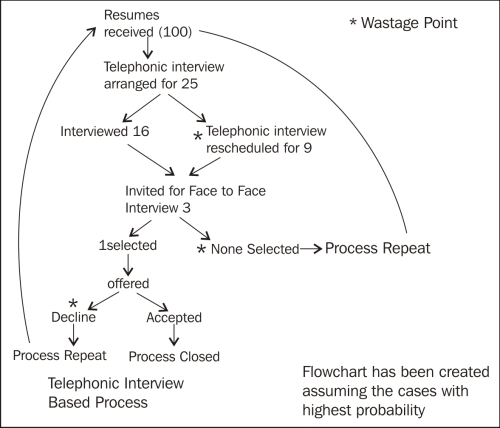A question naturally appeared in the minds of recruiters—as interviews consume a great amount of time, effort, and money, could the telephone interview be an effective solution? Could it be more than just an additional step in an already cumbersome process?
The two following flowcharts show the typical interview processes with and without telephonic rounds respectively. In this case, we assume that the telephone interview in question is not merely a pre-screening, but a well-conducted, detailed interview—the way it should ideally be and as it will be described in detail in the following chapters. The flowcharts clearly illustrate all the stages (based on high probability situations) in both types of processes, and also point out the steps at which resource wastage happens—the wastage points are noted by asterisks.

Flowchart 1.1

Flowchart 1.2
Two important observations can be made even from just a momentary glance at the two flowcharts:
The telephone interview greatly reduces the number of steps in the recruitment process, ensuring faster recruitment for the open position.
Chances of resource wastage are more probable in the traditional interview system
The following table presents the analysis of the wastage points shown in both the methods:
|
Traditional interview without telephonic round (Flowchart 1.1) |
Telephone-interview-based process (Flowchart 1.2) |
|---|---|
|
Arranging face-to-face interviews for 20 or more candidates is a big drain on resources. |
Scheduling telephone interviews takes less time, as candidates can be available at any time during the day. |
|
The probability of process failure is much higher in direct face-to-face interviews because of undisclosed expectations of both employer as well as employee. |
Candidates who appear for a face-to-face interview have already been developed as prospects with great interest in the job opening. A telephone interview provides the candidates with the opportunity to refuse over the telephone if they are not interested. |
|
All the related line managers and HR managers along with the support staff must be available for 15 candidates, taking an enormous amount of time away from other business interests. |
Arranging three face-to-face interviews is less time consuming for everyone, more easily coordinated, less resource intensive, and more targeted. |
|
Resources are wasted unnecessarily in rescheduling interviews for candidates who could not make the original date. |
Rescheduling a telephone interview is relatively easy and can be dealt with comfortably. |
|
The process cycle becomes so long and time consuming that the prospective candidate may lose interest or take an offer from a competitor. |
The process cycle is shorter and more engaging, maintaining the candidate's interest. A shorter cycle also means quicker closure, beating the competition. Moreover, the sooner the employee is brought on board, the faster they can deliver the results. |
One psychological reality that we must never ignore is that when presented with 15 or more options face to face, it becomes very difficult to choose the best three because the factors that should be pertinent only to face-to-face interviews integrate factors that are not dependent on physical presence. It complicates the power of strategic selection by creating a misunderstanding between what is being offered and what is required.
Finally, Flowchart 1.1 shows the completion of the process; another strong possibility is that the recruiter will be left with only two alternatives. They may choose one of the remaining two candidates, compromising on quality by selecting a new hire who was never on the first priority list, or they can repeat the entire process cycle. Either way, it's going to be a massive depletion of resources in time, effort, man hours, and consequently money.
In the case of detailed telephone interviews, there is no body language or facial expression, and hence the focus is only on the voice and the answers of the candidate, and the conviction they carry. This is not the limitation it might seem at first. In fact, most of the important psychological and technical factors can and should be tested on the telephone. The face-to-face interview should judge only the factors that are vital to physical representation of the person, such as soft skills. This leads to a more logical process of selection. Hence, the chances of process failure and repetition are greatly diminished.

